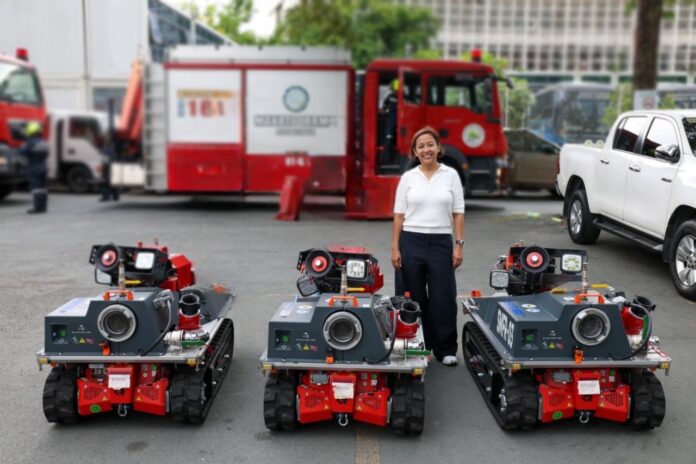The Makati City government has acquired three units of the Rosenbauer Smart Firefighting Robot to enhance the city’s modern emergency response capabilities.
Mayor Abigail Binay said these robots provide an alternative method to assist in fire suppression and rescue efforts, particularly in high-risk incidents involving hazardous materials, thereby reducing the risk to rescuers’ lives.
“The smart firefighting robots will assist our response teams in managing complex and dangerous situations more effectively through advanced features that compensate for human limitations,” she said.
Each robot is designed to withstand extreme heat, poor visibility, and hazardous environments. They are equipped with an acoustic warning device that emits audible signals during operations to alert nearby personnel.
With a maximum payload capacity of 600 kilograms, the robot can function as a mobile platform to drag injured responders or trapped civilians out of danger, minimizing the need to send additional personnel into hazardous zones.
Binay also highlighted that the robots feature remote-controlled mobility operated via dual joysticks, allowing for rapid deployment in high-risk scenarios such as commercial fires, confined space rescues, and other complex emergencies.
The robots’ turrets can discharge between 1,500 to 3,500 liters of water per minute at a pressure of 10 bar, with a vertical reach of up to 80 feet.
“We recognize that being a smart city isn’t just about going digital; it’s about using technology to keep people safe and save lives during emergencies,” Binay said.
Under Mayor Abby’s administration, Makati has continuously modernized its disaster response equipment, procuring various mobile command and emergency response vehicles and gear.
This includes four mobile command vehicles, one advanced mobile emergency communication vehicle, one aerial fire ladder truck, one super tanker, two chemical fire trucks, two rescue trucks, two Urban Search and Rescue (USAR) trailers, 10 rescue boats, two mobile kitchens, 13 basic life support ambulances, three motorcycles, and two mobile clinics.
In 2022, Makati was designated the first-ever Resilience Hub in the Philippines and Southeast Asia by the United Nations Office for Disaster Risk Reduction (UNDRR).
The UNDRR defines resilience hubs as cities, municipalities, or local authorities with political and technical commitment to addressing disaster and climate risks.
Since signing up for the Making Cities Resilient Campaign (MCR) in 2010, Makati has effectively mainstreamed and institutionalized disaster risk reduction in its policies, plans, and programs.
Its best practices in disaster risk reduction have also been shared at various international platforms alongside cities from across the region.









